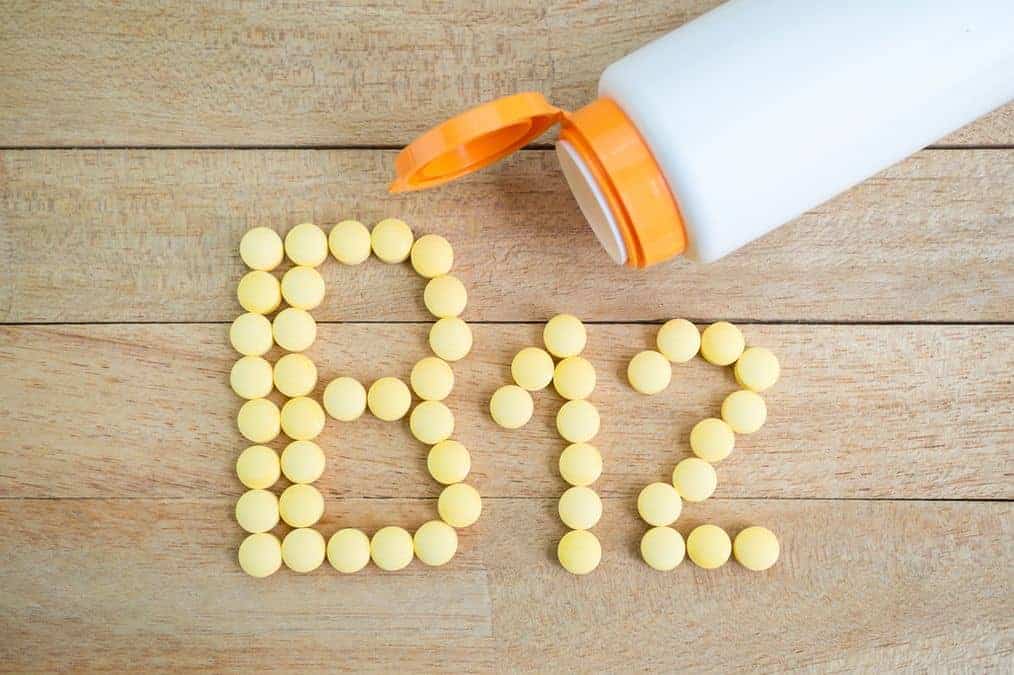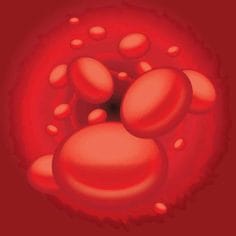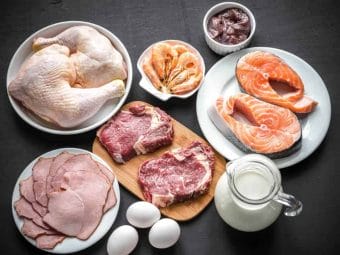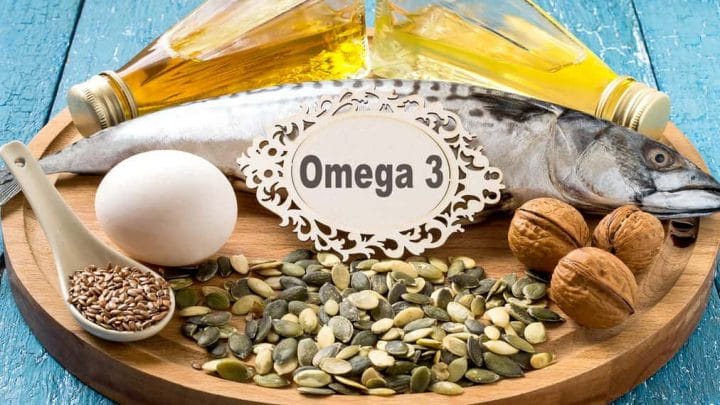
Vitamin B12 – action, properties, role in the body. Symptoms of deficiency
Vitamin B12 is a compound that performs many important functions in the human body. Unfortunately, its deficiencies are often underestimated or combined with other diseases, because they show unusual symptoms. The most important function of this vitamin is its participation in the production of red blood cells and other cells in the body. However, these are not its only properties, as it has many more. Vitamin B12 can be taken with food, although under certain circumstances supplementation is also necessary. What is vitamin B12, what functions does it perform in the body, where it can be found and what are the symptoms of its deficiency?
Contents
- 1 Vitamin B12 – characteristics
- 2 The function of vitamin B12 in the human body human body
- 3 Effects of vitamin B12
- 4 Vitamin B12 deficiency
- 5 Symptoms of vitamin B12 deficiency
- 6 Vitamin B12 – dietary sources
- 7 Vitamin B12 – the vitamin of dirt
- 8 Vitamin B12 – dosage
- 9 Vitamin B12 in prevention and treatment of diseases .
- 10 Vitamin B12 deficiency in the elderly elderly
- 11 Vitamin B12 in tablets
- 12 Vitamin B12 injections
Vitamin B12 – characteristics

Vitamin B12 is also called cobalamin or red vitamin (because of its participation in the production of red blood cells). The first mention of this ingredient appeared in 1835, when a disorder in the production of red blood cells, still known today as pernicious anemia, was first described. In 1920 studies were published that proved that administering liver to dogs that had lost large amounts of blood speeded up their recovery. Tests then began to determine which component of the liver promotes such behavior. These tests showed that, in addition to iron, liver also contains another substance that proves helpful in treating anemia. Researchers were able to isolate a pure red-colored compound from the liver that prevented anemia in small doses. This compound contained phosphorus and cobalt, and was named vitamin B12.
The function of vitamin B12 in the human body human body
The main role of vitamin B12 is its participation in the blood-forming process. The absorption of vitamin B12 takes place in the terminal ileum in the presence of the the presence of factor Castle’a, a glycoprotein produced by the cells lining the stomach. Cobalamin binds to Castle’a to form hematopoiesis factor, which is involved involved in blood formation in the hematopoietic system. Vitamin B12 is necessary for the production of red blood cells in the bone marrow, and additionally participates in the metabolism of DNA and RNA in erythroblasts.
Although this is the most important property of B12 vitamin and it is from it that this compound is best known, its role in the body is much broader.
Other properties of vitamin B12:
- is essential for normal growth;
- participates in the synthesis of proteins and nucleic acids;
- maintains mental health, helping to fight stress and insomnia;
- takes part in the formation of neurotransmitters of the myelin sheath, which influences mental efficiency;
- takes part in metabolism of fats and carbohydrates.
Effects of vitamin B12
Adequate intake of B12 vitamin is necessary for proper functioning of every human being. It takes part in the process of metabolism, improving and stimulating it, which may promote weight loss processes. Few people attach importance to this vitamin, yet it influences energy intake from internal cells, reduces the feeling of fatigue and helps maintain proper muscle activity. Sportsmen, who may have an increased demand for this component, should take care about its proper amount.
Vitamin B12 is responsible for:
- The correct course of many metabolic and energy transformations;
- proper functioning of the nervous system;
- By combining with Folic acid, affects the metabolism of homocysteine (an amino acid, excess of which can cause atherosclerosis);
- takes part in production and maturation of red blood cells;
- enhances functioning of immune system;
- reduces feelings of tiredness and staleness;
- helps maintain proper muscle activity;
- takes part in synthesis of nucleic acids;
- takes part in metabolism of fats and carbohydrates.
Vitamin B12 deficiency
Symptoms of vitamin B12 deficiency may resemble symptoms of many different diseases, therefore, it is rarely rarely we associate them with a lack of cobalamin. Meanwhile, if we do not react quickly enough, the symptoms may worsen, causing deterioration of our physical health, as well as psychological symptoms.
Causes of B12 vitamin deficiency
There are different causes of of vitamin B12 defic iency in our body. The most common ones are:
- too little vitamin B12 in the diet;
- abnormalities of the Castle’s intrinsic factor or congenital deficiency;
- atrophic gastritis gastritis;
- condition after stomach resection due to following surgery;
- Lesniowski-Crohn’s disease;
- dysfunction of the ileum ileum;
- infection with the tapeworm (consumption of vitamin B12 increases);
- chronic pancreatitis;
- Zollinger-Ellison syndrome;
- bacterial overgrowth syndrome;
- celiac disease;
- transcobalamin III deficiency.
Vitamin B12 deficiency can also be caused by certain medications, including:
- proton pump inhibitors (omeprazole, pantoprazole, lansoprazole);
- histamine H2-receptor antagonists H2 receptor antagonists (cimetidine, ranitidine);
- metformin;
- nitrous oxide;
- acetylsalicylic acid;
- sulfasalazine;
- colchicine;
- p-aminosalicylic acid.
Symptoms of vitamin B12 deficiency
Symptoms of vitamin B12 deficiency can appear in different parts of the human body. Most often, they involve the hematopoietic system and occur in the form of anemia. However, disorders of the digestive and nervous systems may also occur. Too little vitamin B12 and folic acid contributes to symptoms in the mental sphere (resembling symptoms of mental illness).
Symptoms of vitamin B12 deficiency – hematopoietic system:
- weakness;
- Headaches and dizziness;
- pallor of the skin;
- painful sores at the corners mouth;
- burning tongue – so called buffalo tongue (smooth, shiny);
- loss of taste;
- loss of appetite (especially aversion to eating meat and fried foods);
- constipation;
- diarrhoea;
- nausea;
- unreasonable weight loss;
- anemia.
Symptoms of vitamin B12 deficiency – nervous system:
- tingling, numbness in arms and legs (paresthesias);
- a feeling of current passing along the spine when tilting the head forward (Lhermitte’s Lhermitte’s sign);
- diminished vision (due to atrophy of the optic nerve);
- seizures;
- loss of vibration and sensation (loss of sense of orientation, sensation of body position);
- pricking in fingertips;
- gait instability.
Symptoms of vitamin B12 deficiency – mental:
- depressive disorders;
- anxiety;
- hypomaniacal syndromes (a state of excessively elevated mood);
- memory disturbances (usually mild);
- cognitive impairment (ranging from mild, even to dementia);
- megaloblastic insanity;
- changes in behavior, personality.
It’s the psychiatric symptoms are the most uncertain because they’re rarely associated a deficiency of an important vitamin. Meanwhile, too little of vitamin B12 can also lead to visual hallucinations and acute psychosis, that don’t respond to standard treatments for this type of condition. Psychotic episodes usually occur in the case of long-lasting and acute cobalamin deficiency, so after the the first episode of mania, it is worth taking into account the diagnostic tests for the content of vitamin B12 in the patient’s body.
Vitamin B12 – dietary sources

We can get vitamin B12 from food. Its largest amounts are found in products of animal origin: meat, fish, eggs, milk, cheese and cold meat. It is estimated that the highest amount of B12 vitamin is found in pike, kidneys and liver (over 20 µg/100 g). Other fish also have considerable amounts of it, among others: herring, trout, mackerel (from 5 to 20 µg/100 g)
Quite large amounts of cobalamin are also found in food yeast.
Vitamin B12 is virtually absent in plant products, so vegans often suffer from deficiencies, and they should primarily rely on its supplementation. Deficiencies of the valuable vitamin B12 are less common in people on a ketogenic diet, which is based mainly on the consumption of animal products.
Vitamin B12 content per 100 g:
- less than 1 µg – milk and milk and milk products (cream, yoghurt, kefir, cottage cheese), egg Egg pasta, chicken breast, pork, pork belly, ham;
- 1 – 5 µg – ripened cheeses (brie, kamamber, gouda, edamame), beef ham, veal, beef, eggs, fish (cod, pollock, hake, flounder, carp);
- 5 – 20 µg – fish (salmon, salmon, herring, mackerel, trout), rabbits;
- more than 20 µg – fish (pike), liver and kidney: pork, beef, veal and poultry.
Can vitamin B12 be overdosed? Symptoms of excess
Anexcess of vitamin B12 occurs very rarely, and the only symptoms found so far are allergic reactions.
Vitamin B12 – the vitamin of dirt
Cobalamin is often also called Dirt vitamin. Why? Well, often deficiencies of this vitamin often occur precisely because in our body there is too few bacteria in our bodies. Although observing personal hygiene personal hygiene protects us from many infectious diseases and parasites, it can also cause vitamin B12 deficiencies. An interesting example is that of monkeys, which in the wild, where they eat little meat and lots of insects, have very high levels of vitamin B12. These levels drop when the animals in sterile conditions in a zoo.
It is worth paying attention to the right B12 in the blood, because its deficiency, although it may not cause may not cause any symptoms for a long time, they wreak havoc in the body and contribute to health-threatening, and sometimes even life-threatening anaemia. Observing personal hygiene is very important and constitutes part of the prevention of many diseases. If, however, we put a premium on cleanliness, it may be worth thinking about supplementation with vitamin B12.
Vitamin B12 – dosage
The demand for B12 vitamin depending on age and gender (recommended data according to the Institute of Food and Nutrition Institute):
- children (1-3 years) – 0.9 μg/d;
- Children (4-6 years) – 1.2 μg/d;
- children (7-9 years) – 1,8 μg/d;
- children and adolescents 1,8 to 2,4 μg/d;
- adults – 2,4 μg/d;
- pregnant women 2,6 μg/d;
- breast-feeding women – 2, 8 μg/d.
Vitamin B12 in prevention and treatment of diseases .
Vitamin B12 is a vitamin with many good properties, therefore its proper level is very important It is of great importance for staying healthy and avoiding various diseases.
Vitamin B12 for prevention of anemia and atherosclerosis
Cobalamin participates in the production red blood cells and helps to maintain their correct amount in the body. organism. This is of great importance in the prevention of anemia. What is more, people who suffer from a deficiency of B12 vitamin may develop megaloblastic anemia, also known as Addison-Biermer anemia. This is a disease that is caused by abnormalities in the production of red blood cells and abnormalities in their function. The red blood cells usually have then also have an altered appearance – they are larger than normal.
Together with folic acid, vitamin B12 takes part in the process of homocysteine metabolism, thanks to which prevents excessive accumulation of this amino acid and can prevent the formation of atherosclerotic lesions.
In prophylaxis of occurrence of In order to prevent the occurrence of hyperhomocysteinaemia it is recommended to consume 400 μg of folic acid folic acid, 3 μg of vitamin B12 and 2 mg of vitamin B6 per day.
Vitamin B12 in the treatment of hepatitis
Studies show that vitamin B12 may be used as an auxiliary in the treatment of hepatitis C Hepatitis C . For many years, a process was observed in which in which patients infected with HCV developed the viral disease into chronic hepatitis or even lead to cirrhosis. The inclusion in the treatment of large doses of vitamin B12 boosted the body’s immune response, increasing the body’s ability to fight the virus.
Vitamin B12 and homocysteine
A very important function of vitamin B12 is the regulation of homocysteine levels, the excess of which contributes The excess of homocysteine contributes to the formation of atherosclerotic lesions. However, not many people However, not many people think about what actually causes an increase in the amount of this amino acid. amino acid. Well, homocysteine is a by-product of metabolism in the body. in the body. Its level increases when we consume large amounts of methionine, which is mainly found in meat. This means that eating too much meat can cause an excess of homocysteine in the body. Other factors can contribute to this other factors can also contribute to this, such as:
- smoking;
- eating large amounts of fast-food;
- diseases: kidney failure, Addison’s-Biermer anemia.
Does B12 vitamin protect against Alzheimera disease?
Specialists point out that a low level of vitamin B12, which so often occurs in older people. may increase the risk of developing Alzheimera disease. Researchers conducted a study that showed that an increase homocysteine levels and the associated decrease in vitamin B12 raises Alzheimera disease risk by up to 17%. It is estimated that increased intake of vitamin B12 by older people older adults may contribute to delaying the onset of the disease. However, studies are still being conducted that would definitively to confirm this theory.
Vitamin B12 deficiency in the elderly elderly

Vitamin B12 deficiency in the elderly is very common, but usually goes unrecognized due to unusual symptoms. The main reason for this is probably dysfunction in the absorption of foods and the nutrients they contain. When symptoms indicative of insufficient cobalamin occur in the elderly, diagnosis should include determination of serum B12 vitamin levels and measurement of serum MMA and homocysteine. Transcobalamin, a protein that binds vitamin B12 in the blood, and active vitamin B12 transported by holotranscobalamin may also be determined.
In people who are found to be B12 deficiency is found, treatment should be initiated as soon as possible as soon as possible. With severe anemia and the occurrence of cardiovascular symptoms, the In case of severe anemia and cardiovascular symptoms, the first step should be Red cell concentrate transfusion. Therapy is mainly administered orally The therapy is mainly oral, sometimes intravenous. The following therapies are also considered therapy involving intranasal delivery of vitamin B12 is also considered.
Vitamin B12 in tablets
When buying vitamin B12 in tablets, it is worth paying attention to the dose contained in one capsule. It is good if it is relatively high, because the absorption of vitamin B12 tablets is a complex process, which with age takes place more slowly, and often there are also disorders in this area. When a deficiency of vitamin B12 is found, it is worth checking whether the supplementation shows its effect, and therefore lowers homocysteine levels. Often, supplementation of vitamin B12 with folic acid, biotin and vitamin B6 is needed for the amount of the amino acid to decrease. It is also worth paying attention to the form of the supplement. A good B12 vitamin should be in the form of methylcobalamin or cyanobalamin.
Read also: Hair loss – what are the causes of the problem?
Vitamin B12 injections
In the case of severe anemia or significant weakness of the body is usually administered vitamin B12 intramuscularly injections. This is only used if it is necessary, as injected cobalamin may cause side effects such as:
- bloating;
- diarrhea;
- vascular disorders;
- pruritus;
- rashes;
- pain at the injection site supplement.



